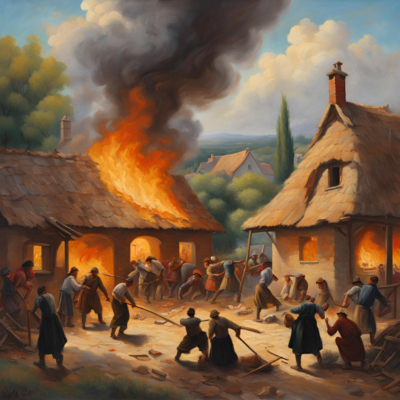9.9 Survival
backHow Early People Learned to Put Out Fire

Thousands of years ago, early humans were figuring out fire. First, they learned how to make it. But then, oops! They realized fire didn’t always stay where they wanted it. Fires could get out of control, and that was a big problem. So, they got clever and started figuring out how to put fires out safely. Here’s how they became the first firefighters!
Dirt and Sand: The First Firefighters
One day, someone must’ve thought, “What happens if I throw dirt at it?” Boom, fire smothered! They discovered that tossing soil or sand onto flames cut off the fire’s oxygen, putting it out. It worked great for small fires, and it quickly became a go-to method. But when it came to big, roaring fires? Dirt just wasn’t enough. Imagine trying to cover a giant bonfire with a handful of sand. Nope, not happening.
The Discovery of Water’s Power
People living near rivers or lakes had a lightbulb moment: “Hey, let’s try water!” Splash! They realized pouring water on a fire not only killed the flames but also cooled the embers, so it didn’t come back to life. Water quickly became a fire-stopper superstar. The only downside? If you were in a desert, good luck finding water! No rivers, no lakes, no water… just hot sand everywhere.
Beating the Flames with Simple Tools
When dirt or water wasn’t around, humans got creative. “What if we smack it with this branch?” They grabbed sticks, leaves, or animal hides and started beating flames out of existence. It worked well on small grass fires, and it probably looked pretty dramatic too. Like firefighters in a dance battle with fire. But sometimes, beating the flames made sparks fly, and things got messy. Oops again.
Fighting Fire with Fire: Controlled Firebreaks
Now this one is wild: they figured out they could stop a wildfire by making another fire. They cleared a strip of land or burned a small area ahead of the flames to remove anything the fire could eat (like grass or wood). When the big fire reached the empty space, it fizzled out. This was genius, but risky. Imagine starting a fire to stop a fire and crossing your fingers it didn’t get out of hand. Brave, right?
Understanding Wind and Fuel
As people got smarter, they noticed that wind and fuel (like dry grass) were fire’s best friends. They learned to never light fires in windy weather, unless they wanted it chasing them. They also started clearing flammable stuff around their campfires. Prevention became the name of the game, because let’s face it: it’s way easier to stop a fire before it starts.
Early humans were fire geniuses. They didn’t have hoses, firetrucks, or alarms, but they figured out clever ways to keep fire in check. And just like making fire, controlling it took brains, patience, and teamwork. Without these skills, fire might have been more of a frenemy than a friend.
